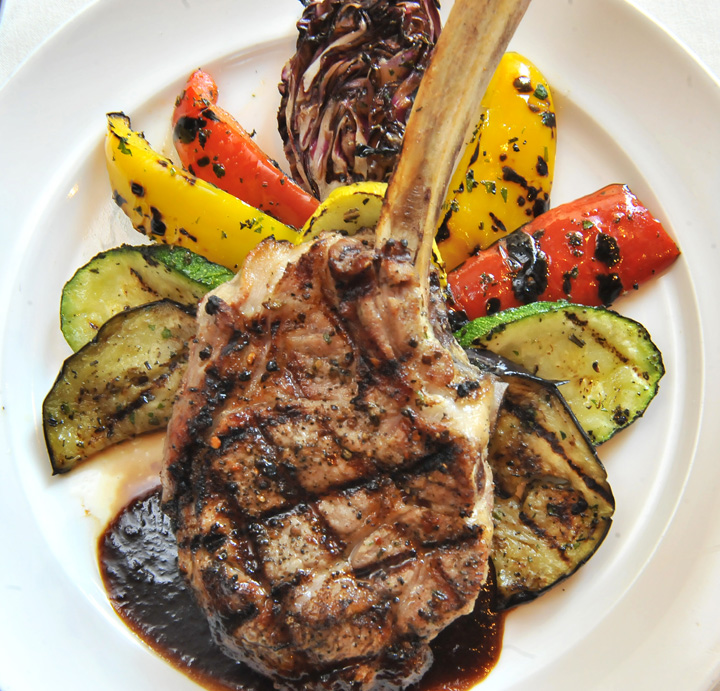TORONTO – Summertime barbecues aren’t always about baby back ribs slathered in sugary sweet barbecue sauce, potato salad and ice-cold Cokes.

There are healthy and unhealthy ways to fire up the grill.
With homemade marinades, healthy oils and experimenting with a wide variety of groceries, barbecuing can be healthy and tasty, registered dietician Samara Foisy, of the Heart and Stroke Foundation’s Health Check program, said.
“There’s always a healthy option out there that you can pick for barbecuing,” Foisy said.
“It’s about picking the right ingredients.”
She offers her tips for healthy grilling for the summer season.
DO: Use lean cuts of meat for the grill
Lean or extra lean beef, turkey, chicken or pork work well, along with skinless chicken breast, beef or pork tenderloin.
Lean meat has protein, iron, zinc and vitamin B.
Good cuts of beef to opt for include eye of round, top round steaks, roasts and sirloin. For pork, tenderloin, boneless loin roasts and boneless loin chops are a griller’s best bet.
- ‘Shock and disbelief’ after Manitoba school trustee’s Indigenous comments
- Invasive strep: ‘Don’t wait’ to seek care, N.S. woman warns on long road to recovery
- Norad looking to NATO to help detect threats over the Arctic, chief says
- ‘Super lice’ are becoming more resistant to chemical shampoos. What to use instead
DON’T: Don’t forget to trim off any visible fat from your meat before cooking. Also don’t forget to use fish as a protein.
“A lot of people forget that fish is like candy when barbecued,” Foisy said.
Salmon, tuna, tilapia, catfish – all options can be cut thicker so they’re easier to handle on the grill.
(Photo courtesy Getty Images)
DO: Use vegetables and fruits on the grill.
“Most people think to think put them in a salad, but there’s lots of great vegetables that can be grilled so experiment with lots of colours and use them on half of your plate,” Foisy said.
Eggplant, zucchini, mushrooms, asparagus, onions and corn are only some of the options Foisy recommends for the grill. They’re chalk full of vitamins and minerals and even low in calories.
Read more: 5 healthy fast food swaps
For fruits, pineapples and peaches make great dessert or snacks after some time on the barbecue.
Foisy suggests pairing grilled pineapple, balsamic vinegar and goat cheese.
DON’T: Don’t stick meat and vegetables on the same skewer. Don’t salt your meats or vegetables.
Protein and vegetables don’t cook at the same rate, so doing so may be a food safety issue, Foisy warns.
As for pre-seasoning meat and vegetables with salt, Foisy suggests skipping that step.
Some grillers think that salt will help tenderize their meat, but Foisy said that it’d take more time than most expect.
Read more: What you should be eating to lower your blood pressure
DO: Make your own marinades and sauces.
Instead of salt, create your own marinades using fresh herbs and spices to cut down on sodium. You can even customize spice blends with Mexican or Mediterranean flavours, Foisy suggests.
Store bought marinades can be packed with sodium and fat. To make your own, use half acid – like vinegar or lemon juice – and half oil – like a canola oil.
Read more: What Canadians want to know about what’s in fast food meals
“Try not to buy from the store because you don’t know what’s in there. You’re going to see it’s going to be a lot healthier to make your own,” Foisy said.
Her own concoction includes low sodium soy sauce, canola oil, shallots, garlic, fresh herbs and a touch of hot sauce.
(Photo courtesy Marvin Joseph/Getty Images)
DON’T: Don’t overdose on oil on the grill.
Rely on canola oil or olive oil but use a spray bottle instead of glazing the grill or your ingredients.
DO: Make your own burger patties and watch for portion sizes.
Frozen burger patties may seem like the easiest option but making your own variety allows you to control how much fat and what ingredients are in your dinner.
With fresh burgers, diners can make their own patties with shallots, green onions, lemon zest or herbs. They can even add seasonings, like jerk spices, to enhance the flavour.
Read more: Top 10: Some of the worst foods for your heart’s health
Making your own burger patties can also help control portion sizes, Foisy said.
To keep portion sizes in check follow this rule of thumb: a quarter pound of hamburger, a 6-ounce steak, and half your plate should be filled with vegetables.
DON’T: Overload on pickled, brined and smoked condiments.
Pickled vegetables, meat soaked in brine and smoked cuts of meat could be loaded with sodium. That’s why Foisy raises red flags for these words.
DO: Make vinegar-based salads instead of mayonnaise-based side dishes.
Diners can shave calories off their side dishes of coleslaw, for example, simply by swapping the mayonnaise for vinegar.
Using basil, mint, rosemary, thyme, oregano or sage can add to seasoning so you don’t necessarily need to rely on mayonnaise.
Pair your meat with green salads, beans, hummus, baked sweet potatoes and whole grain rolls.
“Making these small changes are easy and every little bit counts,” Foisy said.
carmen.chai@globalnews.ca
Follow @Carmen_Chai








Comments